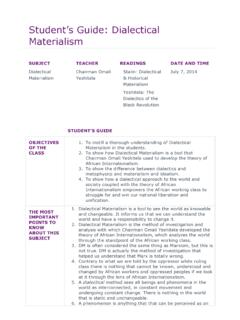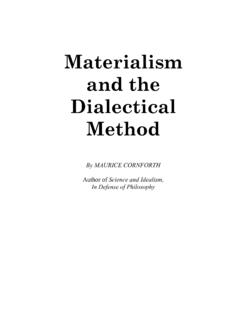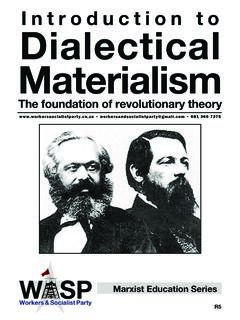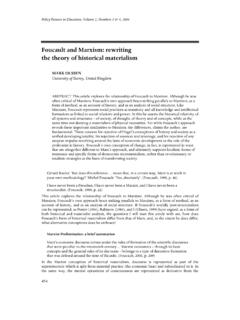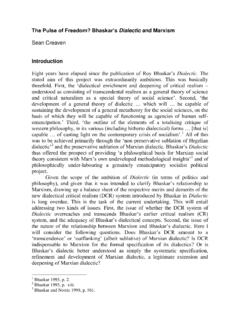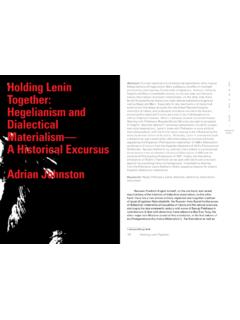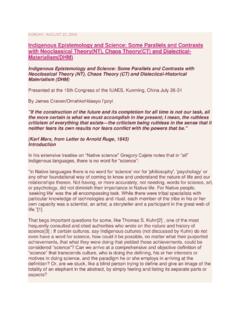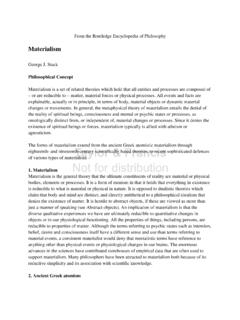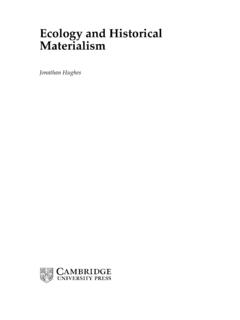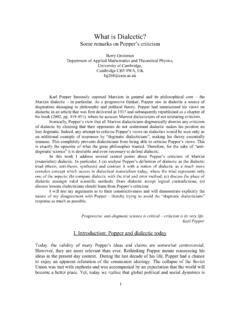Transcription of Materialism and Christian Belief - Jeff Snapper
1 4 Materialism and Christian BeliefAlvin PlantingaAccording tomaterialism, human persons are material objects. They are notimmaterial things, or objects, or substances; neither do they contain as partsimmaterial selves or souls or entelechies. Their parts are material: flesh and bonesand blood, molecules, atoms, electrons and quarks (if in fact there are suchthings). This view, of course, goes contrary to the vast bulk of the Christiantradition. This is not to say,pacePlato (or anyway Socrates), that the bodyis the prison house of the soul, or that our present attachment to the bodyis to be deplored, as if it were a temporary, makeshift arrangement (due tosin?) to be jettisoned in the next life. Not at all; on the traditional Christianview, God has designed human beings to have bodies; they function properlyonly if embodied; and of course Christians look forward to the resurrectionof the body.
2 My body is crucial to my well-being and I can flourish onlyif embodied. As W. H. Auden put it, I wouldn t be caught dead withoutmy body. Materialism goes contrary to the Christian tradition; even worse (so I llargue), it is false. As I see it, therefore, Christian philosophers ought to bedualists. Now most naturalists, of course, are materialists; but so are a surprisingnumber of Christian philosophers. I ll argue that this is a mistake. In AgainstMaterialism same ground as that one. It differs in that it omits a couple of sections; itIn addition to the people mentioned in the text, I thank Michael Bergmann, E. J. Coffman, EvanFales, Richard Fumerton, Trenton Merricks, William Ramsey, and the members of the NotreDame Center for Philosophy of Religion discussion group, in particular Thomas Flint and Petervan Inwagen, as well as the others I have inadvertently overlooked.
3 See Peter van Inwagen,Material Beings(Ithaca, NY: Cornell University Press, 1990),and Dualism and Materialism : Athens and Jerusalem? ,Faith and Philosophy,12/4( ),475 88; Trenton Merricks, The Resurrection of the Body and the Life Everlasting , in MichaelMurray (ed.),Reason for the Hope Within(Grand Rapids, Mich. Eerdmans, 1999); Nancey Murphy Human Nature: Historical, Scientific, and Religious Issues , inWhatever Happened to the Soul?(Minneapolis: Fortress Press, 1998), 1 30; Lynne Rudder Baker, Need a Christian Be a Mind/BodyDualist? ,Faith and Philosophy,12/4( ),498 504;andKevinCorcoran, PersonsandBodies ,Faith and Philosophy,15/3(July1998),324 40. InFaith and Philosophy,23/1(January2006),3 Plantingaalso adds sections dealing with (1) the alleged arguments for Materialism , and(2) the relevance of Christian theism to the question, and (3) an appendix dealingwith the way in which materialists try to explain how it could be that a materialstructure or event could be a Belief .
4 With respect to (2), there are, I believe, atleast three points to be made. First, there is Scripture; the New Testament inparticular contains much that at any rate strongly suggests that Materialism isfalse. Second, Christian theism is crucially relevant to the epistemology of thesituation, and that in at least two ways:(a)GivenChristiantheism,weknowthati tisatanyratepossiblethat therebe immaterial thinking things. God Himself is an immaterial thinking thing;hence, by the argument formab esse ad posse, the most powerful argument forpossibility, it follows that immaterial thinking things are possible. Furthermore, Christian theism strongly suggests that there arecreatedimmaterial thinkingthings: angels, for example, as well as Satan and his minions.
5 (b)ConsiderationsfromtheChristianfaithar epowerfullyrelevanttothealleged objections to dualism and arguments for Materialism . Finally, certain crucial Christian doctrines (for example, Incarnation and theresurrection of the dead) fit better much better, I d say with dualism thanwith ll restrict myself, for the most part, to the second of these three 1 of this paper will follow Against Materialism in presenting a coupleof strictly philosophical arguments against Materialism ; in Section 2 I ll turnto the considerations from Christian TWO ARGUMENTS FOR DUALISMC hristian philosophers, so I say, should be dualists; but of course dualism itselfis multiple, if not legion. There is the view embraced by Plato, Augustine,Calvin, Descartes, and a thousand others according to which a human personis an immaterial substance: a thing, an object, a substance, a suppositum (for myThomist colleagues), and a thing that isn t material.
6 Second, there is the viewthe name dualism suggests: the view according to which a human person issomehow a sort of composite substance S composed of a material substance S*and an immaterial substance S**. Third, there is also the important but obscure view of Thomas Aquinas and hisfollowers. Is this a form of dualism? The question is vexed. According to Aquinas, Substance dualism and Materialism are not uncontroversial contradictories (perhaps, as somesuggest, we aren t substances at all, but events, ormaybe momentary collections of mental states,or transtemporal collections of person statesor stages). For present purposes, however, I ll take itthat substance dualism and Materialism are the only relevant positions, and speak indifferently ofarguments for Materialism and arguments against dualism.
7 See Richard Swinburne,The Evolution of the Soul(Oxford: Clarendon Press, 1986), and Christian Belief101ahumanpersonisamaterialsubstanc ewithanimmaterialpart, , of this immaterial part, that it is itself a substance. Furthermore the soul,this immaterial part, has the property of possibly thinking (believing, desiring,hoping, deciding, etc.), and after death,doesthink. But Aquinas, also says thatthe soul isthe form ofthe body. Aform,however,atleastasfarasIcansee,is or is like aproperty;andaproperty,presumably,can tthink. If the soul is aform, therefore, how can it be capable of thinking? This is a tough question,but perhaps we needn t go into it at the moment. A more pressing question isthis: I ll be arguing that it is possible that I exist when my body doesn t; is thatapossibility,onThomas sview?
8 True,onhisviewmysoulcan exist when mybody doesn t; but it also seems, on this view, that I am not identical with mysoul. Rather, I am a material object that has an immaterial soul as a part. So (onhis view) can I exist when my body does not? If the answer is no, then Aquinas sview is not felicitously counted as a version of dualism; at least it is not amongthe versions of dualism for which I mean to argue. If, on the other hand, theanswer is yes, we can welcome Aquinas (perhaps a bit cautiously) into the more initial comments: (a)whenIspeakofpossibilityandnecessity,I meanpossibilityandnecessityinthebroadlyl ogicalsense metaphysicalpossibility and necessity, as it is also called; (b)Iwon tbearguingthatitispossible that I (or others) can exist disembodied, with no body at all, althoughI believe that this is in fact possible; (c)Iwillmakenoclaimsaboutwhatisor isn t conceivable or imaginable.
9 That is because imaginability isn t strictlyrelevant to possibility at all; conceivability, on the other hand, is relevant onlyif it s conceivable that p is to be understood as implying or offering evidencefor it s possible that p . (Similarly for it s inconceivable that p .) It is thereforesimpler and much less conducive to confusion to speak just of possibility. Itake it we human beings have the following epistemic capacity: we can consideror envisage a proposition or state of affairs and, at least sometimes, determineits modal status whether it is necessary, contingent, or impossible just bythinking, just by an exercise of thought. Summa Theologiae,I, For an interesting suggestion as to the answer, see Brian Leftow s Souls Dipped in Dust , inKevin Corcoran (ed.)
10 ,Soul, Body and Survival(Ithaca, NY: Cornell University Press, 2001), 120 ff. Ican thelpconcurringwithDavidArmstrong,nofrie ndofdualism: Butdisembodiedexistence seems to be a perfectly intelligible at night thinking. Surely it is logically possible that I might be having just the same experiencesand yet not have a body at all. No doubt I am having certain somatic, that is to say, bodilysensations. But if I am lying still these will not be very detailed in nature, and I can see nothingself-contradictory in supposing that they do not correspond to anything in physical reality. YetI need be in no doubt about my identity (AMaterialistTheoryofMind(London: Routledge,1968), 19). See myWarrant and Proper Function(New York: Oxford University Press, 1993), ch.
